Abortion on the left, education on the right: Which pivotal issue will decide Virginia's fate?
- Oops!Something went wrong.Please try again later.
During a candidate meet and greet event just north of Richmond, Virginia, Democratic Virginia Delegate Rodney Willett pleaded his case for maintaining the state’s current abortion law, which allows the procedure through the second trimester of pregnancy.
“You don't have to be a very creative thinker to imagine, to understand or contemplate what Virginia would look like if you don't draw the line there,” Willett told an auditorium of around 20 local voters earlier this month.
Willett is running for reelection this November, when his and every other seat in Virginia’s House of Delegates and state Senate is up for election. Republicans currently control the House by five seats, while Democrats have a two-seat majority in the Senate.
Democratic candidates and activists across the state have campaigned on fear of what a Republican-controlled legislature could mean for abortion rights in Virginia.
Republican Gov. Glenn Youngkin has proposed a 15-week abortion ban, with exceptions for rape, incest and severe medical emergencies. If his party is successful in November, Youngkin would have an easy path to passing this legislation.
Meanwhile, Republicans have appealed to another rising voter concern: education, specifically parents’ rights.
2024 bellwether: Why Virginia's state elections in 2023 could have national implications for next November
Calls from the left to protect abortion rights versus a battle for parents in education isn't unique to Virginia’s off-year election. Karen Hult, a professor and political scientist at Virginia Tech, said the Old Dominion State is emblematic of a larger debate across the country.
“Virginia is a possible state for both parties to try out how various issues are performing with certain kinds of voters or not performing so well with certain kinds of voters,” Hult said. "It may send a signal of what to look forward to going into the November 2024 presidential elections.”
Republicans set their sights on education agenda
Virginia has been a hotbed for education debates since the 2019 gubernatorial race. Then-candidate Youngkin harnessed parents’ anger after his opponent and former Gov. Terry McAuliffe said in a debate, “I don’t think parents should be telling schools what they should teach.”
Youngkin was “skillful” in turn, Hult said, making education and parents’ roles in school a hallmark of his campaign and administration. She said the issue is salient, a conversation involving millions of parents, teachers and students across the country.
Tony DeTora, chairman of the Stafford County GOP in northeast Virginia and father of an 11-year-old daughter, called the pandemic a turning point for parents, as schools closed and remote learning provided a more direct insight into their children’s education.
“Suddenly the students were yanked out of the schools, and they were in people's homes. And the parents, they had to face exactly what was going on. They could no longer assume that the schools and the administrators were doing the things that they were supposed to be doing,” DeTora said. “That really woke a lot of people up.”
Youngkin's education agenda: Can parental rights launch Virginia Gov. Glenn Youngkin to the White House? It's complicated
Education is one of the topics DeTora said he hears about the most from voters in the lead up to this year’s election.
He said conflicts over school issues, such as policies for transgender students or library book bans, has become particularly heated in northern Virginia, including blue cities such as Arlington and Fairfax.
Michele Exner is senior adviser at Parents Defending Education, a nonprofit group focused on giving parents greater control in schools. She is also a parent of two children in the Fairfax County, Virginia, public school system.
Like DeTora, Exner said the pandemic was an “awakening” for her and her husband, when schools closed and implemented restrictions for students and staff.
“The majority of parents, whether it's in this state or across the country, believe that they should absolutely have a seat at the table when it comes to guiding their children's education,” Exner said.
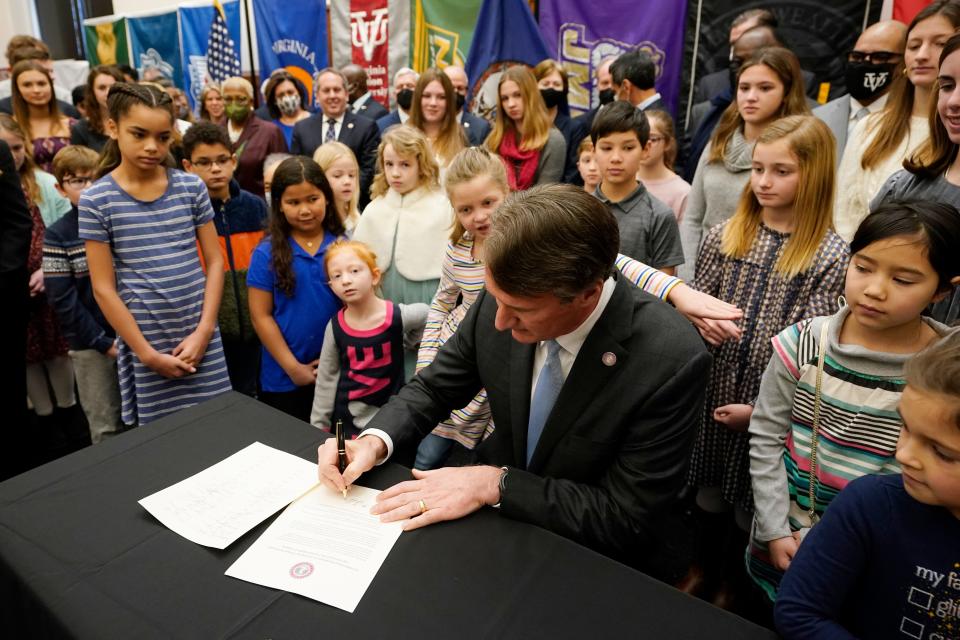
If Republicans hold their House majority and win back the state Senate next month, Youngkin could advance more education legislation, including what Exner said she hopes are policies around transparency and options to opt-out of certain curriculum.
“(Youngkin) ran on a parents matter platform two years ago. Those parents are still there,” Exner said. “And they're certainly excited for what's to come when he has the political power to be able to make some of those changes.”
Critics, however, have said crusades against "red-herring issues" in education are homophobia and discrimination disguised as "rights." Subjects that have drawn ire from parents' rights groups range from reproductive health to racism in American history.
“My main concern is that (Youngkin's) mantra of ‘parents’ rights’ doesn’t apply to all parents," Kandise Lucas, a special education advocate and Virginia parent, previously told USA TODAY.
More: Abortion bans and LGBTQ-targeted laws are catching some school campuses in the crosshairs
Abortion rights at stake this November, Democrats say
Abortion legislation could also be on the agenda for a Republican-controlled legislature, as Youngkin has resumed efforts for a 15-week ban, with exceptions. The state Senate’s Democratic majority has, so far, blocked the governor's push and other proposed abortion restrictions.
Karolina Ogorek, administrative director at an abortion clinic in southwest Virginia, said even if the effects are not immediately felt, she and other clinic workers believe a 15-week ban would be the tipping point for Virginia abortion access.
“It slowly chips away," Ogorek said. “The minute a state starts imposing bans and restrictions, soon after a complete ban will follow. It may take several years, but it will follow.”
Ogorek was the director of a now-closed clinic in Knoxville, Tennessee when the Supreme Court overturned Roe v. Wade last year.
“I watched it happen where we closed down clinics, where physicians left, where physicians were scared to even refer patients to neighboring states for access, because they were afraid of being jailed,” she said.
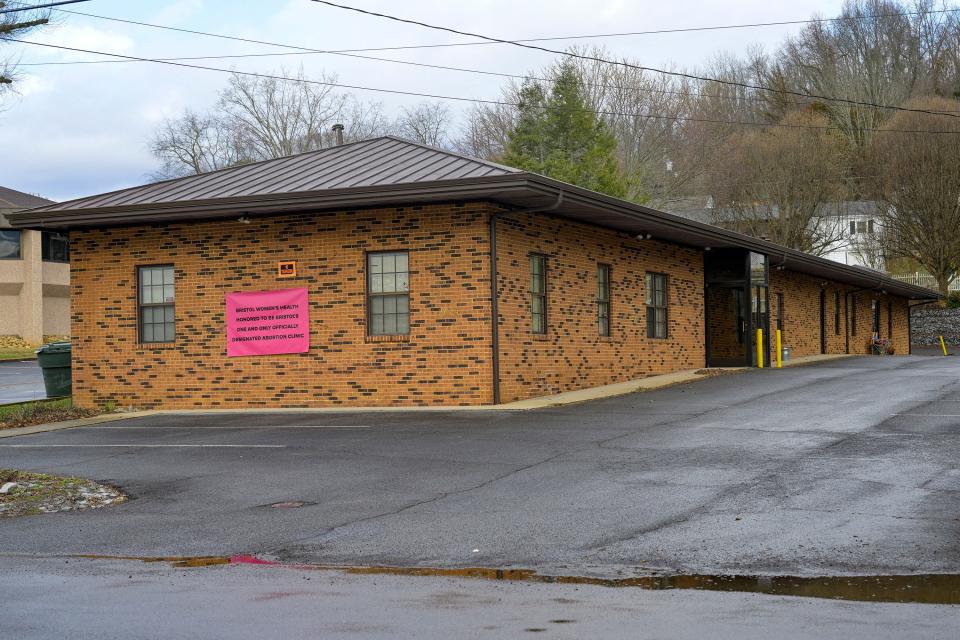
Democratic state Senate candidate Schuyler VanValkenburg joined Willett at the voter event in Henrico County earlier this month, where he argued Virginia should keep its current abortion law to avoid mirroring Tennessee and other neighboring states.
“The status quo works, the status quo protects women's rights,” VanValkenburg said. “And I do not think we should go the route of our southern state friends who have not just passed bans but have then continuously tightened those bans and tightened restrictions to become more punitive.”
VanValkenburg, a teacher and current state delegate, highlighted Alabama, where the state attorney general last month said he would prosecute residents who traveled out of state for an abortion.
Edward Lawson, a retired neonatologist − a doctor who specializes in the care of newborns − was in the audience to hear VanValkenburg and Willet’s defense of abortion rights. He said he believes the candidates were “right on.”
“Women need this right. They need the ability to do it,” Lawson, 77, said.
A poll published last week by Christopher Newport University in Virginia found that 40% of voters in the state believe abortion should be legal in most cases, while 27% said the procedure should be legal in all cases.
Exclusive: Support for legal abortion rises a year after Roe v. Wade overturned-Poll
Virginia, DeTora said, is “not Alabama” but “also not California,” meaning lawmakers in his politically purple home state will have to find “someplace in between those two extremes.”
He said while abortion is on the list of issues Republicans would like to see addressed, it is generally less top of mind for those on the right.
“I'm pro-life, I'm very pro-life," said DeTora. “But I also understand that I live in Virginia. And not everybody around me agrees with me.”
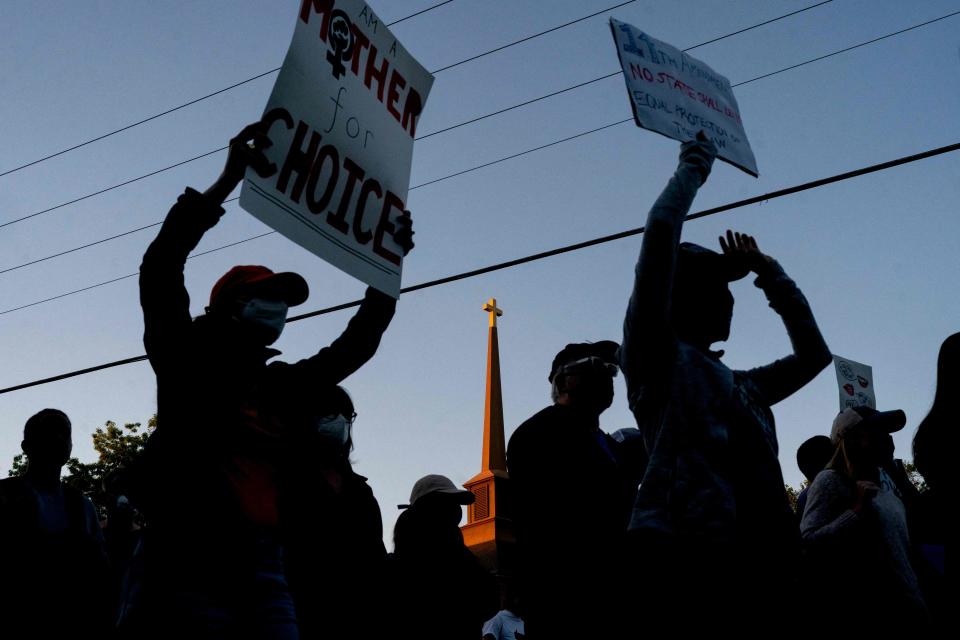
Which issue wins? Depends who you ask.
Virginia’s demographic diversity means the draw of education, abortion or any other issue for middle-of-the-road voters can be a toss-up by district, Hult said.
“In more rural, more conservative parts of the state, opposition to abortion rights or support for restricting abortion access is probably an important issue, but perhaps not the most motivating,” she said.
"Abortion rights and reproductive rights more generally may be more of a voting issue in some parts of the Northern Virginia suburban areas, and certainly around the capital of Richmond and the surrounding areas there," she added.
Early voting began in most Virginia districts at the end of September. The outcome, though, will likely come down to the very end of election night, Hult said. If she was going to guess a winner now, she said she would estimate “a somewhat better year for Republicans,” due in part to President Joe Biden’s approval levels in the state.
In the poll by Christopher Newport University, 39% of Virginians said they approve of Biden’s administration. By comparison, 50% said they approved of Youngkin as governor.
With concerns about inflation and the cost of living looming, DeTora also predicted that many Virginia voters will consider their neighbors in the nation's capital while filling out the state ballot.
“People will go and vote against the party in power,” he said. “We're close enough to D.C. and we understand what's driving it. It's not Governor Youngkin's policies that are driving it, it's policies from Washington, D.C., so we're going to vote against the Democrats this year.”
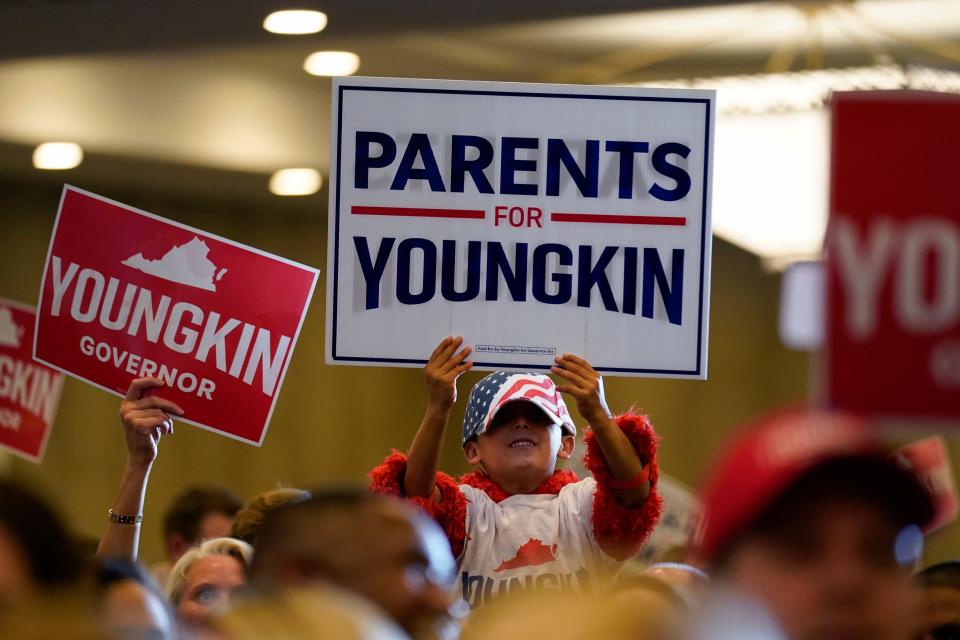
Youngkin gives Republicans roadmap for future elections
Youngkin’s popularity goes beyond his own state, as national Republicans are eyeing the governor for a potential late 2024 presidential bid.
“He certainly has not done that much to squelch that kind of attention because that's played to his favor,” Hult said.
Billionaire and GOP megadonor Thomas Peterffy has donated millions to Youngkin’s Spirit of Virginia PAC, whose funds go in part toward supporting state Republican candidates across Virginia. Other major donors also converged in Virginia Beach this week for Youngkin’s second annual “Red Vest Retreat,” named for the governor’s signature campaign attire.
Despite these and other flirtations with top party figures, Youngkin has said repeatedly he is focused on Virginia and the 2023 elections.
“It's really humbling when people talk about 2024 and a national role for me,” Youngkin told USA TODAY in August. “And I thank them, and then I reiterate that I've got a big job to do here in Virginia right now.”
Youngkin for President?: The Virginia Gov.'s own constituents call him 'a big unknown.'
Youngkin’s tight-lipped responses are strategic, Hult said.
“I don't think he's taking (a presidential campaign) off the table,” she said. “But I do think he quite wisely is focusing only on the Commonwealth.”
Virginia’s governor is a popular alternative to Republicans dissatisfied with former President Donald Trump and other current presidential candidates, DeTora said.
"He's standing for the right things. He's doing the right things,” DeTora said. “He won in a state that nobody thought a Republican could win in again, so he's a very attractive candidate beyond Virginia."
However, Republicans who look to Youngkin for 2024 are “wishcasting,” he said. DeTora said he believes his governor will stay "laser-focused" on Virginia through the next two years of his term.
“He has a job to do here. He was elected to do it. He has every intention of doing it,” DeTora said.
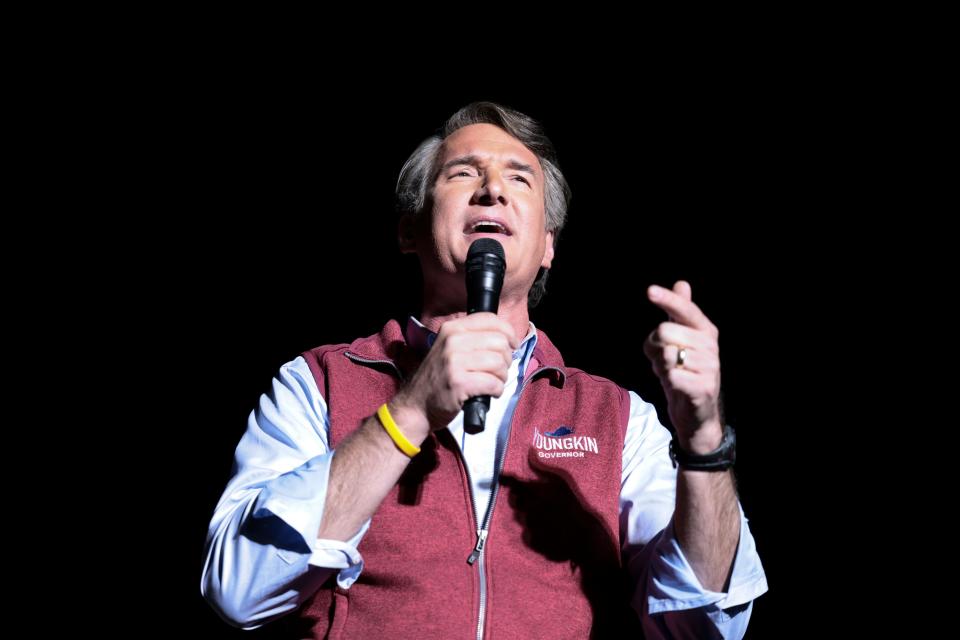
This article originally appeared on USA TODAY: Education and abortion take center stage in Virginia 2023 elections

